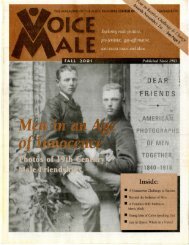When Men Do Nothing - Voice Male Magazine
When Men Do Nothing - Voice Male Magazine
When Men Do Nothing - Voice Male Magazine
Create successful ePaper yourself
Turn your PDF publications into a flip-book with our unique Google optimized e-Paper software.
Desire<br />
by George Bilgere<br />
The slim, suntanned legs<br />
of the woman in front of me in the checkout line<br />
fill me with yearning<br />
to provide her with health insurance<br />
and a sporty little car with personalized plates.<br />
The way her dark hair<br />
falls straight to her slender waist<br />
makes me ache<br />
to pay for a washer/dryer combo<br />
and yearly ski trips to Aspen, not to mention<br />
her weekly visits to the spa<br />
and nail salon.<br />
And the delicate rise of her breasts<br />
under her thin blouse<br />
kindles my desire<br />
to purchase a blue minivan with a car seat,<br />
and soon another car seat, and eventually<br />
piano lessons and braces<br />
for two teenage girls who will hate me.<br />
Finally, her full, pouting lips<br />
make me long to take out a second mortgage<br />
in order to put both kids through college<br />
at first- or second-tier institutions,<br />
then cover their wedding expenses<br />
and help out financially with the grandchildren<br />
as generously as possible before I die<br />
and leave them everything.<br />
But now the cashier rings her up<br />
and she walks out of my life forever,<br />
leaving me alone<br />
with my beer and toilet paper and frozen pizzas.<br />
George Bilgere has published several books of poetry and hosts Wordplay, a spoken-word radio program that’s<br />
been called the Car Talk of poetry.<br />
A Feminist Responds to Desire<br />
Reading this poem set the feminist neurons in my brain firing. Something about it didn’t sit right with me. Perhaps<br />
it was the theme of man-as-provider with its explicit descriptions of what he’d “pay” for, what he’d “purchase” for<br />
her. The narrator expresses dedication to the family he dreams of, surprising me by tempering his objectification<br />
of the woman’s body with a longing for the domestic. Like many lonely, single men, he is not able to access whatever<br />
emotional ties he might feel for his children or wife and cannot envision himself explicitly saying how much he cares.<br />
Instead, he hides behind his material and financial contributions to their welfare.<br />
Though the sight of the woman’s legs arouses a refreshing fantasy of family, not sex, it’s the poem’s representation<br />
of the woman that’s troubling. Her “slender” and “delicate” body, along with her “straight” hair, call up an image of<br />
the tired-out beauty ideal of a thin white woman dominant for far too long. (Not to say thin white women cannot be beautiful—they<br />
are—but repetitively equating a single body type with what constitutes beauty and perfection deprives readers<br />
of a rainbow of other possibilities.)<br />
Despite the narrator’s descriptions of old-school domestic femininity and gender roles, I found myself empathizing<br />
with him, glimpsing a snapshot of his interior life. He appears to be a man whose own conceptions of his masculinity<br />
are in transition. Even as he objectifies her, his desire for the domestic seems to suggest a steering away from traditional<br />
masculinity. One day, perhaps, he’ll be able to leave his lonely life of beer and frozen pizza and co-create with a partner a<br />
life that’s rich, whole and equal.<br />
<strong>Voice</strong> <strong>Male</strong> intern Maia Mares will be entering her junior year at Amherst College in the fall.<br />
—Maia Mares<br />
10 <strong>Voice</strong> <strong>Male</strong> PREVIEW<br />
To receive the full issue and to subscribe please go to: http://voicemalemagazine.org/donate










